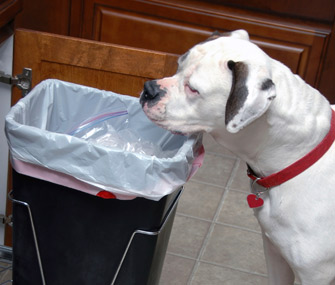Why Does My Dog… Dig in the Trash Can?
Published on October 14, 2014
Skip To

According to most experts, dogs were domesticated from wolves by humans several thousand years ago. The speculation is that wolves may initially have been captured as puppies or tamed due to living in proximity to human villages. Why would these wolves live close to human villages? To scavenge our trash for food, of course!
In the wild, wolves may go several days without eating. They are not always successful in hunting big game every day. We may consider the food we throw out to be garbage, but to some dogs, it is merely food — stinky, ripe, aromatic food! It is a bouquet of scents that are interesting and exciting to them.
Some dogs have developed a game of digging through the trash. Sometimes they find good stuff to eat or fun things to chew on. When they are so engaged in sniffing out an interesting scent, they may scatter the refuse all through the house. The garbage may be akin to a doggie version of a Cracker Jack box — they know there’s a prize inside.
Other dogs have learned that digging in the trash is a good way of getting an owner’s attention, so it becomes attention-seeking behavior. Your dog may have formed the association that, “Every time I drag a tissue out of the trash, my mom or dad suddenly starts talking to me and tries to take my new toy away.” What fun it is for them to play keep-away and have their owners chase them around the house! Whereas if the dog did not get an item out of the trash, the owners may not have paid the dog as much attention.
Stopping Doggie Dumpster Diving
There are several things you can do to help keep your dog out of the trash.1. Hide the can. This is the best and easiest method. Do not leave temptation out. Put the trash can in a cupboard or pantry. If your dog has learned to open cupboards, use a child lock.
2. Contain the trash. Use a trash can with a tight lid that stays on even when your dog knocks it over. Modern trash cans with motion sensors that automatically open the lid won’t do. Nor will trash cans with step pedals or swinging lids. Dogs have gotten their heads stuck through swing lids, and if a can is heavy enough, a dog sometimes learns to step on the pedal and open the lid.
3. Try training. The one method that requires the most work is teaching your dog to “leave it.” I first teach a dog to turn away or back off from my hand while I am holding treats. Once the dog has learned the phrase “leave it,” then I use that phrase every time the dog goes near the trash. When the dog backs or turns away, I immediately offer him praise and treats. When I am not working with the dog, I put the trash can away. After repeated training sessions, I leave the trash can out for longer periods and offer praise and rewards every time the dog walks past the trash can and does not stop to investigate. I may even go a step further and start with a trash can that does not contain any food. Then, in more advanced training sessions, I bait the trash can with really pungent foods.
As always, consult your veterinarian or pet behavioral professional as a first step when dealing with a pet behavior problem.
More on Vetstreet.com:
- Why Does My Dog… Kick Grass After Pooping?
- Why Does My Dog… Chase His Tail?
- Why Does My Dog… Drop To The Ground When He Sees Other Dogs?
- Why Does My Dog… Cock Her Head?





